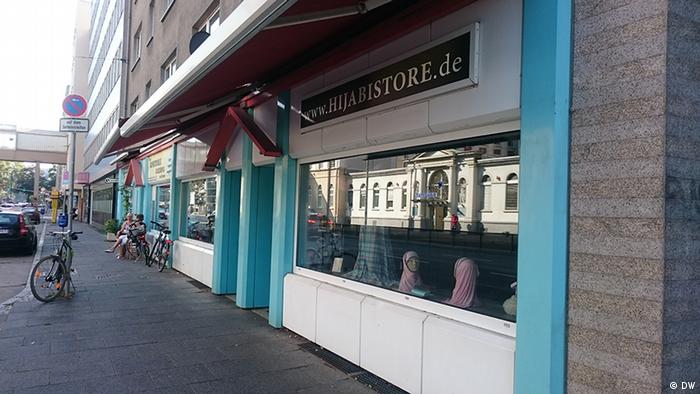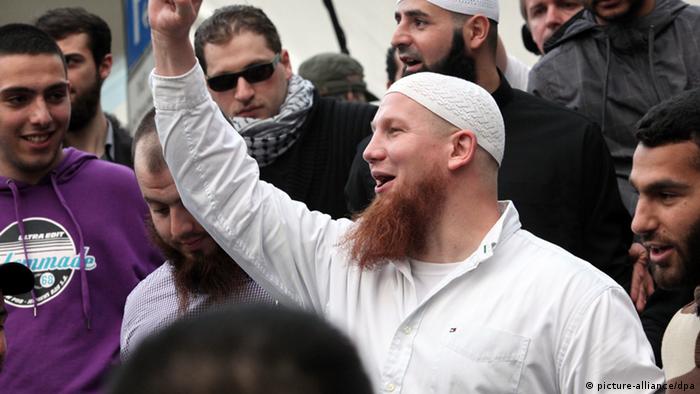Thursday, September 15, 2016
Muslim fashion shops in Germany linked to extremist Salafists
Hijab stores in Germany have been recently making headlines after reports that they serve as stepping stones to extremism. Through clothing, they propagate a sub-culture that promotes patriarchy and Islamic extremism.
The Hijabi store in a central Frankfurt district sells niqabs, burqas and others kinds of veils for orthodox Muslim women.
The outlet has several choices for women wanting to try out different versions of the Islamic garment, all of which are on display on the company's website. These include long linen dresses with high collars in muted colors like brown, mauve and green. For festivities, women can choose between different designs in abayas - or robe-like dresses, some trimmed with brocade and some with high, frilled Edwardian-style collars.
The store also offers a selection of veils and small decorative pins to secure it. Inside the veil, women often wear a tube-like stretchy collar, which keeps the hair from straying outside the headscarf.
The Hijabi has made the headlines for its alleged links with Salafists. Earlier this week, Germany's public broadcaster ARD ran a report on how stores like Hijabi and a similar one in Wuppertal, in the country's west, helped women integrate into an orthodox Islamic way of living, eventually assimilating them into Salafism and subsequently, extremist Islam.
DW tried contacting the owners of Hijabi and other Islamic clothes stores like the Hoor-al-ayn in Berlin. Unfortunately, there was no response to our requests for interviews.
The Salafist lifestyle
According to the Brookings Institution, "Salafism is the idea that the most authentic and true Islam is found in the lived example of early, righteous generations of Muslims, known as the Salaf, who were closest both in time and proximity to the Prophet Muhammad."
Stores selling niqabs and burqas have sprouted in Germany only in the last 10 or 15 years, Susanne Schröter, expert on Islamist feminism and extremism at the University of Frankfurt told DW. Nowadays, one sees more women wearing the niqab also because German women want to dress up in this manner.
"This shop in Frankfurt, Hijabi, is linked on the one hand to Salafist consumer culture. Salafism is not just a religious or political movement, it's also a lifestyle. People who follow this ideology want their whole life to be shaped according to the Salafist utopia," she added.
Many Salafist women prefer organic products, because everything was organic when the prophet was alive. "It includes soap, freshly pressed fruit juices and all kinds of things. There are even labels that offer Islamic clothing for men, including T-shirts with slogans," Schröter explains.
When fashion gets dangerous
Wearing a burqa becomes a kind of rebellion in a country like Germany, where emotions are strong against the Muslim garment. Its wearers believe that obeying the laws of their God is much more important than the enemies they make because of their choice of clothing, Schröter says.
A "typical" outfit in the Salafist sub-culture includes a long skirt, topped with a khimar, or a loose, knee-length shawl with long arms. A pair of gloves and a headscarf completes the outfit. There is also a discussion about which colors are suitable for niqabs. These outfits are also available for children, as young as two-years-old.
"This is why these shops are so dangerous. They are part of a culture in which members want to express that they belong to this Islamist ideology. Patriarchy, anti-democratic thinking, support for violence - because they believe they live in a world which is anti-Muslim - are all part of this thinking," Schröter says.
The link with fundamentalists
These shops could help people find a link with groups that propagate such thoughts, Schröter says, also because they initiate buyers into Quran-reading and other similar activities to influence their mindset.
Hijabi's owner, Latifa Rouali's father Abdellatif, is a well-known Salafist in the southern and southwestern Rhine-Main-Sieg region. Rouali was also a founder of the banned Dawa FFM, an organization that called on believers to follow the Quran. He is also known to have been closely linked with Pierre Vogel, who openly advocates the supremacy of Sharia - or Islamic law - over all earthly constitutions.
In 2014, for example, Rouali set up a shop in Frankfurt's central Stiftstrasse, called "Mekka." But repeated complaints from neighbors forced him to shut shop. "They closed the business because they found out that the 'Mecca' water he was selling was not from the holy city, but from Frankfurt's water supply," Schröter said.
But reports about Rouali's connections to Islamic hate-preachers are no reason for the German government to stop him from undertaking other activities or jobs for a living. Just because Rouali was part of a banned organization does not mean the law can prohibit him from starting a business.
"Everyone can open a business as long as they are not selling or doing anything against the law," Schröter explains.
Subscribe to:
Post Comments (Atom)







No comments:
Post a Comment